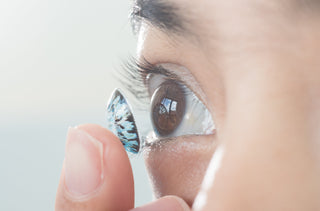Are you experiencing tingling or watery eyes? It could be allergic conjunctivitis, which is a common eye inflammation. This type of conjunctivitis does not harm your eyes or cause any vision complications. And unlike bacterial and viral conjunctivitis, allergic conjunctivitis does not present a risk of contamination. Here are the symptoms and treatments of allergic conjunctivitis in detail.
What is allergic conjunctivitis?
Allergic conjunctivitis is an inflammation of the conjunctiva in response to an allergen in your environment. The conjunctiva is a transparent membrane that covers the eye and the inside of the eyelids. This membrane swells and becomes inflamed when it reacts to allergenic particles.
Pollens are the main known allergens that cause chronic allergic conjunctivitis. This is why spring is when there are more allergic reactions. During this season, grasses, trees and herbaceous plants release their pollen.
Other potential allergens can trigger allergic conjunctivitis. These can be found in your living environment: pet hair, dust mites, makeup, mould, or even chlorine in swimming pools.
Allergic conjunctivitis is often associated with allergic rhinitis, which causes sneezing and a runny nose.
The duration of allergic conjunctivitis depends on the exposure time to the allergen and each individual.
What are the symptoms of allergic conjunctivitis?
Allergic conjunctivitis is accompanied by stinging, burning, redness and tearing. The symptoms are similar in both eyes. More rarely, allergic conjunctivitis may affect only one eye, or one eye may be more affected than the other.
Other symptoms may arise with allergic conjunctivitis, mainly caused by pollen. These include itchy eyes and nose, sneezing and nasal congestion. In these cases, it becomes difficult to avoid rubbing and scratching the eyes. Over time, this rubbing can lead to erythema and swollen eyelids.
What are the treatments for allergic conjunctivitis?
When possible, avoid exposure to allergens until the symptoms subside. At home, you can apply cold water compresses to relieve the discomfort.
You can also find over-the-counter eye drops containing antihistamines, such as ketotifen. These products are usually enough to relieve the symptoms. If allergic conjunctivitis causes dry eyes, you can liberally use hydrating eye drops.
If this treatment is ineffective enough in relieving your allergic conjunctivitis, you should make an appointment with an optometrist.
Allergic conjunctivitis: When should you consult a professional?
It is best to consult a health or vision professional (physician, optometrist or ophthalmologist) if:
- Eye drops containing an antihistamine do not help;
- Your eyelids continue to swell.
Other prescription antihistamine eye drops exist as well as anti-inflammatory eye drops that can provide soothing relief.





















































